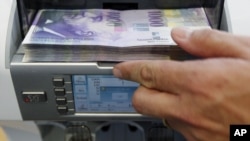Switzerland is moving to protect its exporters hurt by Europe's financial crisis, putting a cap on the franc's exchange rate against the euro.
With world stock markets experiencing huge swings in value on an almost daily basis, some investors have turned to gold and purchase of the Swiss currency as safe havens from the market turmoil. That in turn has made the franc more valuable, and the country's exports more costly on world markets.
But the Swiss central bank said Tuesday it would no longer allow the euro to trade below 1.2 francs, aiming for what it called a "substantial and sustained weakening" of the country's currency.
Investors continued to sell stocks on most world exchanges after Monday's steep losses.
European stocks were down in afternoon trading, and some Asian markets continued their slide, driven by fears of slowing growth in the United States and the sovereign debt crisis in Europe.
Japan's closely watched Nikkei index closed down by 2.2 percent, at its lowest level since April 2009, while similar losses were recorded elsewhere in Asia, except in Hong Kong, where stocks rose. Export-oriented manufacturers suffered some of the heaviest losses.
Gold rose to an all-time high at more than $1,919 an ounce before settling back. A flight to U.S. Treasury bonds drove yields to their lowest level in more than 60 years.
Tuesday's stock trading followed losses Monday of around 3 percent in major Asian markets and more than 4 percent in European financial capitals. Analysts blamed the European losses in part on concerns about Greece's ability to meet its debt obligations and the viability of the region's common currency, the euro.
In Singapore, Finance Minister Tharman Shanmugaratnam was quoted saying a new global recession is now more likely than not. However, World Bank President Robert Zoellick said at the same conference be believed a double-dip recession will be avoided.
The two-day round of stock selling in Asia was sparked by Friday's U.S. report that showed stagnant job growth. The data increased concerns that the United States could lapse back into recession.
Worries about U.S. growth were compounded by a downbeat report on China's services sector.
Some information for this report was provided by AP, AFP and Reuters.











